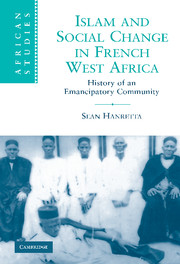Book contents
- Frontmatter
- Contents
- List of maps and figures
- Acknowledgments
- Note on orthographic conventions
- Abbreviations used in references
- Introduction
- Part One “The Suffering of Our Father”: Story and Context
- Part Two “I Will Prove to You That What I Say Is True”: Knowledge and Colonial Rule
- Part Three “What Did He Give You?”: Interpretation
- 6 Lost Origins: Women and Spiritual Equality
- 7 The Spiritual Economy of Emancipation
- 8 The Gift of Work: Devotion, Hierarchy, and Labor
- 9 “To Never Shed Blood”: Yacouba, Houphouët, and Côte d'Ivoire
- Conclusions
- Glossary
- Note on References
- Index
- Books in This Series
6 - Lost Origins: Women and Spiritual Equality
Published online by Cambridge University Press: 15 December 2009
- Frontmatter
- Contents
- List of maps and figures
- Acknowledgments
- Note on orthographic conventions
- Abbreviations used in references
- Introduction
- Part One “The Suffering of Our Father”: Story and Context
- Part Two “I Will Prove to You That What I Say Is True”: Knowledge and Colonial Rule
- Part Three “What Did He Give You?”: Interpretation
- 6 Lost Origins: Women and Spiritual Equality
- 7 The Spiritual Economy of Emancipation
- 8 The Gift of Work: Devotion, Hierarchy, and Labor
- 9 “To Never Shed Blood”: Yacouba, Houphouët, and Côte d'Ivoire
- Conclusions
- Glossary
- Note on References
- Index
- Books in This Series
Summary
Moodinun ni yaxarin soron ya yi.
“Marabouts” are female persons.
– Soninke adage reported by Mamadou DiawaraThe origins of social or religious movements are often elusive. Indeed, the question of origins in general typically leads to a misty terrain where it becomes difficult to determine precisely who did what, exactly which actions were decisive and where one phenomenon shades into another. Walter Benjamin went so far as to assert that while origin was “an entirely historical category,” origins could not be “discovered by the examination of actual findings” for they depended rather on the “subsequent development” of events and represented a rupture in that development rather than a smooth process of coming into being. Looked at this way, origins thwart standard methodologies; they are only constituted retrospectively, so contemporaneous sources are generally useful only as unconscious witnesses at best, and posterior sources are overdetermined by the ideological value representations of origins often attain. These problems are compounded greatly when the movement in question is small, so that the “quantum” effects of microhistorical forces amplify the usual uncertainty. Origins may thus be a matter of empirical facts, but they are not the object of positive knowledge.
These dangers notwithstanding, venturing into such uncertain realms can bring substantial rewards by offering new perspectives on presumably well-understood events, by forcing an examination of accepted standards of explanation and, not least, by heightening awareness of the operation of our methods.
- Type
- Chapter
- Information
- Islam and Social Change in French West AfricaHistory of an Emancipatory Community, pp. 189 - 207Publisher: Cambridge University PressPrint publication year: 2009



